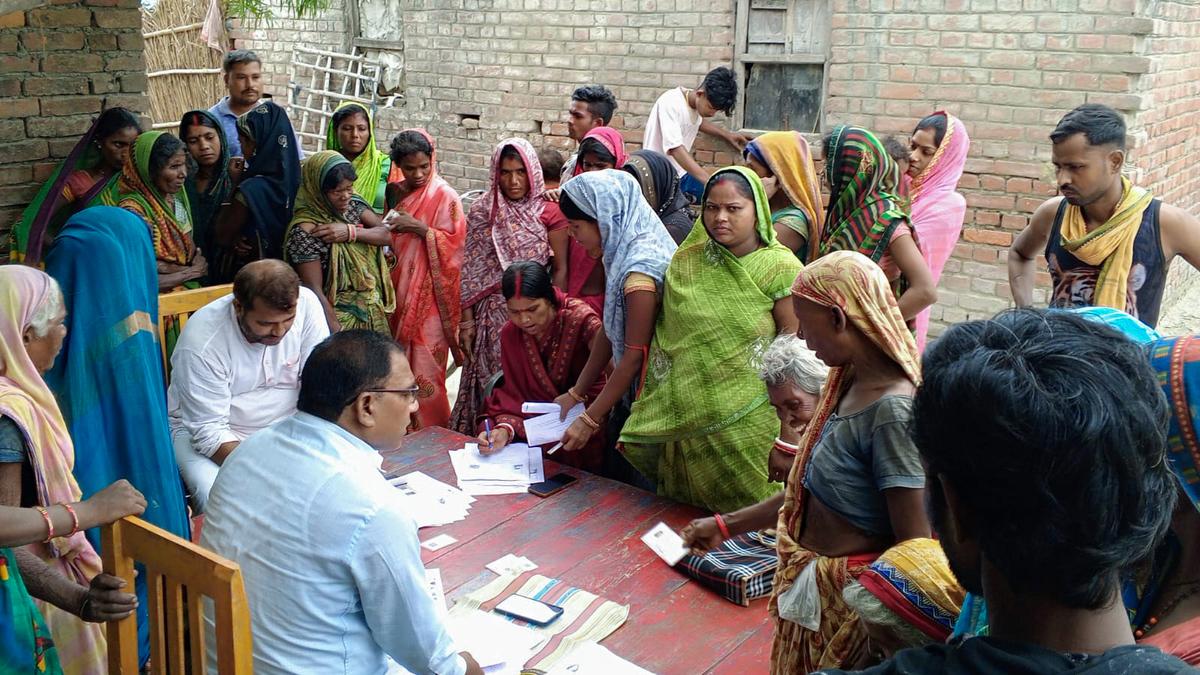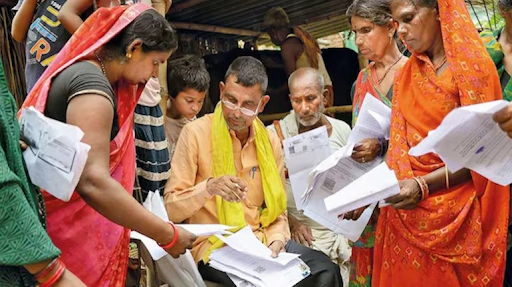




Copyright infringement not intended
Picture Courtesy: THE HINDU
The Supreme Court is hearing cases related to the Special Intensive Revision of Bihar electoral rolls, raising questions about the legal status of the 'right to vote.
The Article 326 states that elections to the Lok Sabha and State Legislative Assemblies must occur "on the basis of adult suffrage."
|
Prelims Booster => Article 326 sets the foundational principle of "one person, one vote" for all adults. |
Originally, the minimum voting age in India was 21 years. However, the 61st Constitutional Amendment Act in 1988 amended the Representation of the People Act, 1950, to reduce the voting age from 21 years to 18 years
Representation of the People Act, 1950 (RPA 1950) => Covers things like dividing the country into electoral areas (constituencies), allocating seats in Parliament and State Legislatures, defining who can vote, and preparing voter lists.
Representation of the People Act, 1951 (RPA 1951) => Outlines how elections take place, the qualifications and disqualifications for candidates who want to run, rules against corrupt practices, and how to resolve disputes that arise from elections.
|
Prelims Booster => Voting Rights of prisoners?
|
N.P. Ponnuswami vs Returning Officer (1952) => Supreme Court stated that the right to vote, and to challenge an election, is not a fundamental right but a statutory one.
Jyoti Basu vs Debi Ghosal (1982) => Supreme Court stated that "a right to elect, is neither a fundamental right nor a Common Law Right. It is pure and simple, a statutory right."
People's Union for Civil Liberties (PUCL) vs Union of India (2003) => Linked Voter's right to information about candidates (criminal records, assets, education) to the fundamental right to freedom of speech and expression (Article 19(1)(a)).
Raj Bala v/s State of Haryana (2015) => Supreme Court termed both the right to vote and the right to contest elections as "constitutional rights.”
Anoop Baranwal v/s Union of India (2023) => Majority judgment considered the right to vote a statutory right.
|
Type of Right |
Description |
Example |
Enforceability |
|
Natural Rights |
Inherent to human beings; not necessarily codified but may be interpreted into fundamental rights. |
Right to life and liberty |
Not directly enforceable by courts without codification. |
|
Fundamental Rights |
Guaranteed under Part III of the Constitution (Articles 12-35); considered inviolable and essential for human development. |
Right to Equality (Art. 14), Freedom of Speech (Art. 19) |
Directly enforceable via Article 32 (SC) & Article 226 (HC). State cannot violate. |
|
Constitutional Rights |
Provided by the Constitution but fall outside Part III; though less protected than Fundamental Rights, they are still higher than statutory rights. |
Right to Property (Art. 300A), Right to Vote (Art. 326) |
Enforceable via Article 226 or specific statutory mechanisms. |
|
Statutory Rights |
Conferred and regulated by ordinary laws made by Parliament or State Legislatures; can be created, modified, or repealed by legislative action. |
Right to Information (RTI Act), Right to Education Act, MGNREGA, Right to Vote (dominant view) |
As per Law |
The right to vote is based on Article 326 of the Constitution, but it is implemented through specific laws (RP Acts). Courts largely view it as a statutory right, though recent rulings suggest a constitutional status and even a link to fundamental rights, making it an evolving idea.
Clearer judicial decisions on the legal nature of the right to vote, whether fundamental or statutory, could strengthen democratic rights and resolve existing ambiguities.
Must Read Articles:
Threat to India's Voting Rights
special categories of voters, their voting methods
Legalities of voting and contesting in elections.
Source: THE HINDU
|
PRACTICE QUESTION Q. The concept of "universal adult franchise" in India is enshrined in which of the following Articles of the Constitution? A) Article 324 B) Article 325 C) Article 326 D) Article 327 Answer: C Explanation: Article 326 of the Indian Constitution provides for elections to the House of the People and to the Legislative Assemblies of States to be on the basis of adult suffrage. |
Article 326 of the Indian Constitution provides for universal adult franchise, forming the constitutional basis.
The Representation of the People Act, 1950, and the Representation of the People Act, 1951, are the primary statutes.
Laws like the RP Act, 1951, allow disqualification on grounds like unsoundness of mind, crime, corrupt practices, or imprisonment.




© 2026 iasgyan. All right reserved